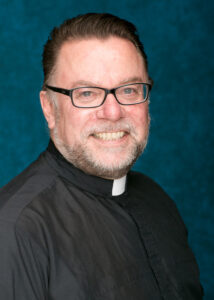God said to Moses, “I have observed the misery of my people … I have heard their cry … I know their sufferings. I will send you to liberate my people.” But Moses said to God, “If I come to the Israelites and say to them, ‘The God of your ancestors has sent me to you’ and they ask me for a name, what shall I say to them?’ God said to Moses, ‘I am who I am. Say this to the Israelites, “I am has sent me to you.'” – Exodus 3:7-14

Jaime Edwards-Acton
During this election season, I am reminded of a speech that then-Candidate Barack Obama made to a cheering multitude gathered in Chicago as the results were coming in on Super Tuesday, 2008. “Change will not come if we wait for some other person or some other time,” he proclaimed. “We are the ones we’ve been waiting for. We are the change that we seek.”
When I think about the injustices and inequities that exist in our society when it comes to the criminalization of mental health challenges and poverty and how marginalized communities are impacted most by the police incarceration industry, I am convinced that many of us truly do see the problems. Many of us even feel them firsthand, viscerally, and are frustrated and outraged.
And we can imagine solutions, too. We can envision just alternatives to how policing is done, who is incarcerated and why, and how needs are met in a mental health crisis. The bigger problem for many of us is that we relate too much with Moses at the beginning of the Israelites’ liberation journey in Egypt. Who am I to make a difference? This challenge is too great. My contribution would be too small. I’m not enough to change the situation. We don’t believe in our agency.
Moses asks who he should say sent him to make a difference. God responds, “Tell them, I am sent me to you.” I love that. I imagine that line was just as confusing to Moses as it is to us. But perhaps the message is designed primarily for Moses, not the Israelites. “I am sent me to you.” In other words, I, Moses, sent myself to you because I believe I am enough to help us change our current reality. God is in this, too, but we will take the lead. We are the change that we seek.
As we get closer to the end of Holy Week, let us remind ourselves that Good Friday is ultimately not a story of intimidation, fear, suffering, and death. It is a story of solidarity, liberation, love, and agency. It is a story that invites us to join Jesus in claiming our agency and sending ourselves, rather than waiting for someone else, or a better time, to change the course of history. There is no one else to step up and insist that none of us are anything less than God’s beloved, and we deserve to be treated as such. We are the ones we’ve been waiting for.
The Rev. Canon Jaime Edwards-Acton is rector of St. Stephen’s Church, Hollywood; priest-in-charge of St. Be’s (St. Barnabas’s Church), Eagle Rock; and executive director of the Jubilee Consortium.
